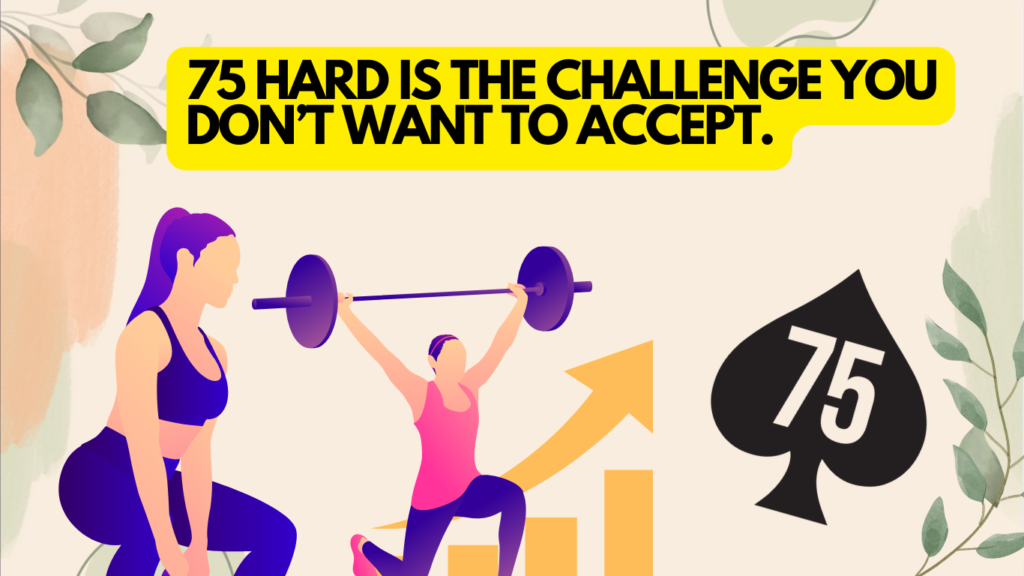75 HARD is a popular fitness and self-improvement program that has been gaining traction in recent years. With its strict requirements and grueling daily tasks, represented by the 75 HARD logo, it’s no wonder that many people consider it to be the challenge they don’t want to accept. But what exactly is 75 HARD, and why has it become such a popular challenge among fitness enthusiasts and people looking to improve their mental toughness? In this article, we’ll take a closer look at the requirements of 75 HARD, the pros and cons of taking on the challenge, and what you need to know before deciding whether or not to accept this demanding and life-changing program.

75 HARD AND ANDY FRISELLA.

75 Hard is a popular fitness program created by entrepreneur Andy Frisella. The program consists of 75 days of two daily workouts, each 45 minutes long, along with following a strict diet and drinking one gallon of water per day.
Participants are also required to read 10 pages of non-fiction every day and take a progress photo.
The program has gained a lot of attention and popularity in the fitness community, with participants proudly sharing their progress and results on social media using the 75 Hard logo.
It is not just about physical fitness, but also about developing mental toughness and discipline.
While 75 Hard has received criticism for promoting an unhealthy and unsustainable lifestyle, Frisella emphasizes that the program is not intended to be a long-term solution.
He acknowledges that the program is difficult and requires sacrifice, but argues that it is a valuable tool for developing discipline and confidence. Many participants have reported significant improvements in their physical and mental health, as well as their productivity and overall outlook on life.
In conclusion, 75 Hard and Andy Frisella have created a program that has inspired many people to prioritize their health and develop discipline in all areas of their lives. The 75 Hard logo has become a symbol of the program’s values and the dedication of its participants.
THE CLAIMS THAT ANDY MAKES ABOUT 75 HARD ARE AS FOLLOWS:
Andy Frisella, the creator of the 75 Hard program, makes several claims about the benefits of the program. Firstly, he claims that it helps participants to develop mental toughness and discipline, which can lead to success in all areas of life. Frisella believes that completing the program will instill a mindset of perseverance and resilience that we can apply to our personal and professional goals.
Secondly, he claims that the program will lead to significant physical improvements, including weight loss, increased muscle tone, and improved cardiovascular health. The two daily workouts and strict diet plan are designed to challenge the body and help participants achieve their fitness goals.
Frisella also claims that the program will improve participants’ overall well-being, including their mental health and productivity. By committing to daily exercise, reading, and self-reflection, participants can develop a sense of purpose and direction that can positively impact their personal and professional lives.
The program is not just about physical fitness, but also about developing habits and routines that lead to success in all areas of life. Despite some criticism of the program’s strict rules and requirements, Frisella stands by his claims and argues that the program has helped thousands of people improve their lives.
Overall, the claims that Andy makes about 75 Hard suggest that it is a challenging but rewarding program that can lead to significant improvements in physical and mental well-being.
And here is our first issue:
The 75 HARD program, as exemplified by its 75 HARD logo, represents a rigorous commitment to discipline and self-improvement. The idea is that by following a strict regimen of daily exercise, water intake, and reading, participants will develop the mental toughness and resilience necessary to overcome any obstacle.
However, while discipline is undoubtedly a crucial component of personal growth, it is not a panacea for all of life’s challenges. Most of us actually deal with complicated problems that have many facets and we cannot resolve them solely through willpower.
For example, weight issues often stem from a combination of genetic, environmental, and psychological factors, and require a more nuanced approach than simply eating less and exercising more. Likewise, many people find themselves in jobs they hate because of systemic barriers such as economic inequality, lack of access to education, and discrimination.
And while confidence, great relationships, and financial security are certainly desirable, they are not always within our control. Sometimes life throws us curve balls that require us to adapt and persevere, regardless of how disciplined we may be.
WHAT IS 75 HARD?

Andy Frisella, the creator of the program, asserts that the ideal duration for the challenge is 75 days as it can lead to permanent changes in one’s life. However, it’s important to note that there is no scientific evidence supporting this claim. The rules for 75 HARD are as follows:
You must follow a diet:
While the program aims to help individuals develop mental strength, but many people are overlooking one aspect: adherence to a strict diet. While we can improve our well-being by following a healthy diet, It is problematic to think that what we eat determines our value or identity.
Diet culture perpetuates the harmful notion that our bodies are never good enough, and that we must constantly strive to attain an idealized version of ourselves. Programs like 75 Hard only reinforce this mentality, creating a sense of pressure and guilt for individuals who struggle to stick to a specific diet.
What’s more, the idea of a “challenge” program in itself can be detrimental to one’s mental health. The constant pressure to push ourselves to the limit can lead to burnout and a sense of failure if we’re unable to keep up with the demands of the program.
Rather than focusing on external goals and achievements, we should prioritize self-care and developing a positive relationship with our bodies. This means listening to our bodies’ needs and treating ourselves with kindness and compassion.
Ultimately, the 75 Hard program is just one example of the pervasive diet culture that exists in our society. It’s important to recognize that what we eat doesn’t determine our worth or identity. We are so much more than the food we consume.
You must drink a gallon of water every day.
One of the requirements of the 75 Hard program, as indicated by the 75 Hard logo, is to drink a gallon of water every day. While hydration is certainly important for our overall health, the idea of consuming such a large amount of water can be overwhelming for some individuals.
In fact, drinking too much water can be dangerous, leading to a condition called hyponatremia, which occurs when the body’s sodium levels become dangerously diluted.
Furthermore, the idea of imposing strict rules around hydration can be harmful for individuals who struggle with disordered eating. For some individuals, the requirement to consume a specific amount of water every day can trigger obsessive behavior around food and fluids, leading to a preoccupation with tracking and monitoring their intake. This can further fuel an unhealthy relationship with food and body image, which is the opposite of what the 75 Hard program aims to achieve.
While it’s important to prioritize hydration, it’s equally important to listen to our bodies’ cues and respond accordingly. For some individuals, consuming a gallon of water every day may not be necessary or even feasible.
Rather than following a rigid set of rules, we should focus on tuning into our bodies and giving them what they need. This means drinking water when we’re thirsty, and paying attention to how our bodies feel throughout the day.
You must do two 45 minute workouts a day
Another main criteria of the program is to perform two 45-minute workouts every day for 75 days in a row. These workouts can be any type of physical activity, such as weightlifting, running, swimming, or even yoga.
While the two daily workouts may seem daunting, they serve as a crucial aspect of the program. By committing to a consistent workout routine, participants develop a sense of discipline and determination that carries over into other areas of their lives.
Despite the benefits, completing the 75 HARD program requires significant dedication and sacrifice. Participants must find time in their busy schedules to fit in two workouts every day, even on weekends and holidays. They must also follow a strict diet and avoid alcohol and other indulgences for the duration of the program. However, those who complete the challenge often report feeling stronger, more focused, and more confident in their abilities.
You must read 10 pages of a book.
This is a positive rule of the program because reading can help to develop discipline and mental toughness, which are critical for achieving personal goals and overcoming challenges. Making a commitment to read 10 pages each day, regardless of other demands and distractions, demonstrates a willingness to prioritize personal growth and development.
You must take photos of yourself every day to track your ‘progress.’
Although Frisella claims that 75 HARD is not primarily a weight loss challenge, he still includes the rule to take daily photos of oneself. However, it may be unclear how taking pictures of one’s body could measure progress in mental toughness.
You must take a daily 5-minute cold shower.
As part of the 75 HARD challenge, participants are required to take a daily 5-minute cold shower. This task may seem daunting and uncomfortable, but it can have significant physical and mental benefits. Cold showers improve circulation, boost immunity, and increase energy levels. Moreover, they can help to reduce stress and improve mood, leading to greater mental clarity and focus.
Facing the discomfort of a cold shower each day requires mental toughness and discipline, and can help participants develop greater resilience and determination in all aspects of their lives.
Furthermore, taking a cold shower each day can be a powerful reminder of one’s own strength and ability to overcome challenges. By facing the discomfort and pushing through it, participants can build greater self-confidence and a stronger sense of personal agency.
Overall, the daily 5-minute cold shower may be a difficult and uncomfortable task, but it can have significant physical and mental benefits, as well as serve as a powerful reminder of personal strength and resilience.
The 75 HARD logo is a great representation of this challenge since it emphasizes strength and tenacity. It can also motivate competitors to fight through discomfort and accomplish their objectives. By cultivating mental toughness, discipline, and resilience through daily cold showers, participants can develop skills and qualities that will serve them well in all areas of their lives.
You must practice random acts of kindness.
Mandating acts of kindness as part of a fitness challenge seems disingenuous. The motivation behind performing a good deed should come from a genuine desire to help others, not as a checkbox to tick off on a daily checklist.
On the other hand, this rule can lead to increased feelings of empathy, compassion, and social connection, which can have a positive impact on mental health and overall well-being.
Don’t be a follower:
It’s important to remember that just because someone else has had success with a particular program, it doesn’t mean that it’s right for everyone.
It’s easy to be swayed by the success stories of others, especially when they’re accompanied by glossy photos and persuasive testimonials. However, it’s important to remember that we’re all different, with unique bodies, lifestyles, and personalities.
What works for one person may not work for another, and attempting to follow a program that isn’t suited to our needs or abilities can be frustrating, demotivating, and even harmful to our health.
The 75 HARD program requires a significant amount of time, energy, and discipline, which may not be feasible or realistic for everyone. It’s important to consider our own schedules, commitments, and priorities before committing to a program that may not be sustainable in the long term.
Additionally, it’s important to approach any new challenge with a realistic understanding of our own limitations, both physical and mental. Pushing ourselves too hard or too quickly can lead to injury, burnout, or other negative outcomes.
In conclusion, while the 75 HARD program may be a good fit for some, it’s important to remember that we’re all different, and what works for one person may not work for another. It’s important to approach any new challenge with a critical eye and a realistic understanding of our own abilities and limitations.
The 75 HARD logo may symbolize strength and discipline, but true strength lies in knowing when to push ourselves and when to listen to our bodies and our intuition.
Quick answers to frequantly asked questions:
What happens after I complete 75 HARD?
After completing the 75-day challenge, many participants choose to continue their fitness and self-improvement journeys by setting new goals and establishing positive habits. The skills and mental toughness developed during the program can also be applied to other areas of life, such as work, relationships, and personal growth.
What role does the 75 HARD logo play in the overall branding and marketing of the program, and how effective has it been in promoting the challenge to new participants?
The 75 HARD logo is a central component of the program’s branding and marketing efforts. The logo’s bold and distinctive design, with its blocky lettering and black-and-white color scheme, has helped to establish the challenge’s identity and make it instantly recognizable to participants and fans. The logo has also been effective in generating buzz and interest around the program, as many people are drawn to the challenge’s rigorous requirements and the mental and physical benefits it promises.
Can participants use the 75 HARD logo on their social media profiles or merchandise to promote their involvement in the program?
Yes, participants are generally allowed to use the 75 HARD logo on their social media profiles and merchandise to show their participation in the program. However, it’s important to note that there may be certain guidelines or restrictions around the use of the logo, such as limitations on modifying or altering the design, or guidelines around the use of the logo in marketing or promotional materials.
How has the 75 HARD logo evolved since the program’s inception, and what changes have been made to it over time?
The 75 HARD logo has undergone some minor changes and updates since the program’s inception, but its overall design and branding elements have remained largely consistent. Some changes to the logo over time have included modifications to the lettering or color scheme, or updates to the program’s tagline or other branding elements. However, the basic design of the logo has remained recognizable and iconic, serving as a powerful symbol of the 75 HARD challenge and its emphasis on mental and physical toughness.






